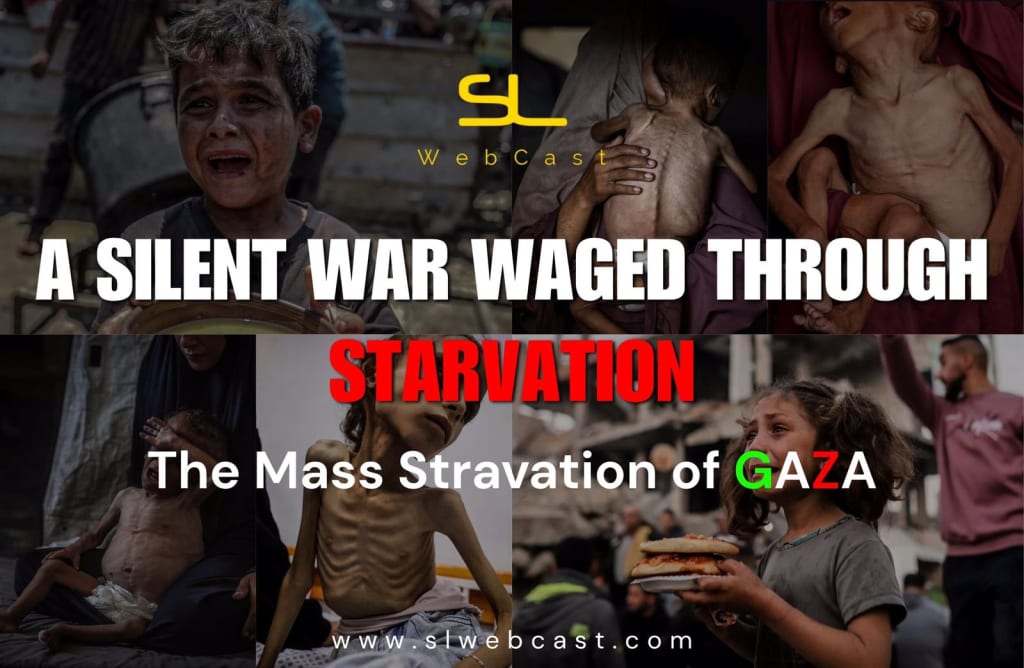The absence of a baby’s whimper was more haunting than a scream.
It wasn’t the scream that pierced the nurse’s heart, but the absence of one.
Wrapped in a threadbare cloth far too thin for the scorching summer heat, a child no older than six months lay in her mother’s arms at Al-Awda Hospital in northern Gaza. “She was too weak even to cry,” the mother murmured in a raw voice, her eyes hollow not from sleeplessness, but from watching her loving daughter’s body starve and shrink from hunger. There was no milk left to nourish her, and nothing else left to provide.
This isn’t fiction. This isn’t even a historical tragedy. This is Gaza in 2025.
STARVATION AS A WEAPON
The starvation of Gaza is no longer a consequence of war—it has become a deliberate weapon of war.
Since March 2, 2025, the Israeli siege has blocked nearly every humanitarian and commercial supply line, effectively cutting off food, fuel, and medicine to over two million Palestinians, turning the land into a graveyard filled with hollowed eyes and empty stomachs. Aid convoys are blocked, agricultural lands have been decimated, and food prices have skyrocketed by over 3000%, making basic staples inaccessible.
According to UN reports, more than 93% of Gaza’s population suffers from acute food insecurity.
It has been officially confirmed that at least 875 people died from starvation by mid-2025. Amnesty International reports: “Even aid workers in Gaza are suffering from hunger while trying to feed victims.” At least 67 Palestinians were killed per day while lining up for food, and over 1,000 have died since May while attempting to reach humanitarian aid centers.
Reports from APF International reveal that photojournalists in Gaza also suffer severe malnutrition while documenting the crisis firsthand. According to the latest reports from AP News, 48 people, including 20 children, died from acute malnutrition in just one month.
THE RISK OF FAMINE FOR CHILDREN
A UNICEF article titled “Risk of Famine for Children in Gaza” states that over 71,000 children under five years old are projected to suffer from malnutrition. Over 17,000 pregnant and breastfeeding mothers urgently require nutritional intervention.
The deliberate restriction of food and essential supplies—especially when it targets the most vulnerable like children, the sick, and the elderly—meets the definition of collective punishment, which is strictly prohibited under international law.
KIDS: THE YOUNGEST VICTIMS OF STARVATION
The innocent little hearts bear the heaviest burden of this man-made famine.
Children who need constant nourishment to grow are fading away in hunger and silence.
According to UNICEF and the World Food Programme, nearly 1 in 3 children under five in Gaza suffers from acute malnutrition. Hospitals without electricity or clean water are overcrowded with infants too weak to cry. Al Jazeera reports that acute malnutrition in northern Gaza doubled in one month, affecting 31% of children under two in February, compared to 15.6% in January.
Severely underweight children now fill makeshift wards. Most are too weak to eat, even when food occasionally arrives. Their eyes are hollow, their skin paper-thin, and their limbs motionless.
The fear of bombardments has stolen their sleep, security, peace, and the very warmth of childhood.
These children are not just casualties of war; they are defenseless targets. This crisis has robbed them of health, education, childhood, and even their future.
STARVATION AS A VIOLATION OF INTERNATIONAL LAW
Using hunger as a weapon is not only morally indefensible—it is a violation of international law.
According to the Fourth Geneva Convention and Additional Protocol I, starvation of civilians as a method of warfare is strictly prohibited. No side in a conflict may ever use starvation to harm civilians.
In the case of Gaza, multiple legal experts and humanitarian agencies have pointed to Israel’s blockade, aid denial, and systemic targeting of food distribution as violations of international legal frameworks.
Experts from the WHO, UN agencies, and human rights organizations label the crisis as a “man-made mass starvation.” Blockaded borders, destroyed agriculture, and targeted aid disruptions are all part of this systematic suffering.
Amnesty International reports that Israel continues to use starvation as a weapon of war against Palestinians in the occupied Gaza Strip. UN rights experts also accuse Israel of employing starvation and violating international law.
THE SHAKING VOICES THE WORLD IGNORES
Amid Gaza’s devastation lie countless untold stories—in every tent, every family, every soul, and every dead body. These stories are folded into silence, carried in trembling arms.
Seventeen-year-old Mahmoud, the eldest of four, waits in line for bread each day, only to return with empty hands—and sorrow. In desperation, he boils grass and mixes it with animal feed to calm his siblings’ cries.
Layla, a mother, no longer sings lullabies.
Each night, she rocks an empty cradle.
Her infant, Sami, died in her arms from hunger.
At Nasser Hospital, doctors described seven-year-old Amal as “just bones covered by a thin layer of skin.” Weighing only 10 kg, her parents fear she won’t survive another week while aid remains blocked.
Another boy, thirteen-year-old Abdul Hamid Al Guhalban, died holding a loaf of bread, hoping to share it with his siblings.
These are not just emotional stories. They are the painful daily reality in Gaza.
INTERNATIONAL SILENCE
The world is not unaware of Gaza’s crisis. Governments and institutions are constantly updated through live streams, news alerts, and social media.
Yet, they choose to remain silent.
Gaza’s streets echo with the cries of starving children. Still, international powers continue to scroll through horrifying headlines.
The hunger, bombed-out hospitals, and the deaths of small, empty stomachs have failed to shake the global conscience.
Institutions once built to protect the vulnerable now remain shackled by politics.
Conferences are held—but bread never reaches the empty hands.
THE SMALLEST HANDS NEED THE LOUDEST VOICES
The world has watched too long.
Screens are flooded with images of Gaza’s pain—coffins and hollow cheeks.
But empathy alone cannot fill empty stomachs.
Action is needed.
Global institutions must go beyond statements and enforce accountability on those using starvation as a weapon.
But this isn’t just about governments.
It’s about us—you, me, every single voice.
We must share the truth, support verified relief funds, and continue to speak about their pain.
In this crisis, every act of compassion brings hope.
Gaza needs something far beyond sympathy.


